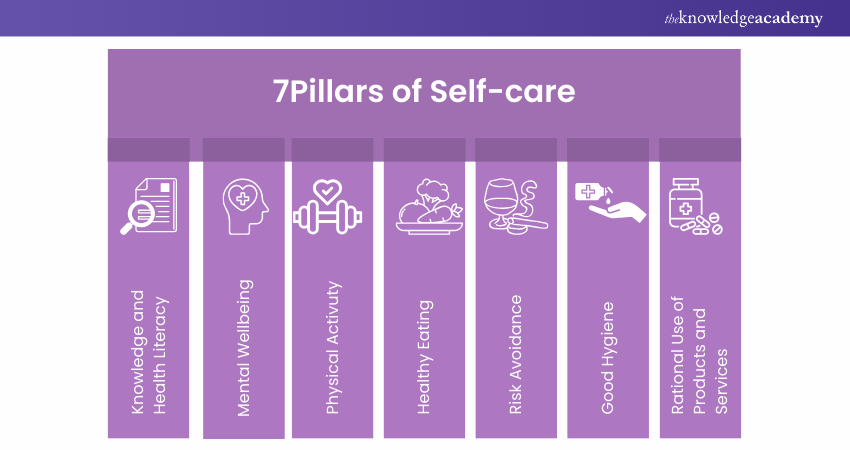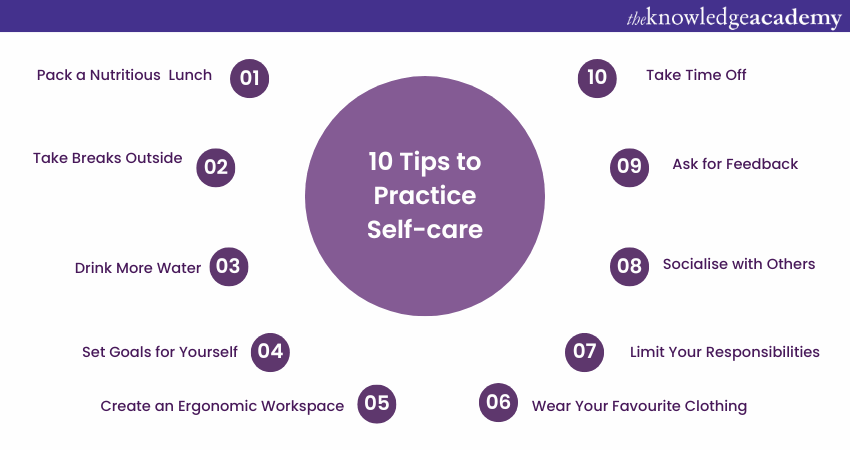We may not have the course you’re looking for. If you enquire or give us a call on 01344 203999 and speak to our training experts, we may still be able to help with your training requirements.
We ensure quality, budget-alignment, and timely delivery by our expert instructors.

Do you ever feel like there’s never enough time in the day to take care of yourself? In the hustle of meeting deadlines, it’s easy to overlook your well-being. That’s where Self-care becomes essential. Self-care is about intentionally making choices to support your mental and physical health, whether it’s enjoying a peaceful walk, staying hydrated, or creating a workspace that feels right for you. In this blog, we’ll explore What is Self-care matters and share ten actionable tips to help you prioritise your well-being every day.
Table of Contents
1) What is Self-care?
2) Why is Self-care Important?
3) What are Examples of Self-care?
4) What are the Benefits of Self-care?
5) 10 Tips to Practice Self-Care
6) What Should you Avoid in Self-care?
7) Why do I Struggle with Self-care?
8) Conclusion
What is Self-care?
Self-care is about taking care of yourself in ways that improve your health. It's not a new idea, but it's become more popular recently. This can include anything that makes you feel better in body and mind.
People often talk about Self-care as making a deliberate choice to do something good for yourself. This can help reduce Stress, build good habits, and help you understand your needs better.
Why is Self-care Important?
Self-care is essential for a happy life. Taking care of your overall health helps you take control of your overall well-being.

In our busy lives, it's easy to forget to prioritise ourselves, especially when we have many responsibilities and others to care for. However, looking after yourself makes you feel better, and when you feel good, you perform better in all areas of life, from work to relationships.
Self-care doesn't need to take a lot of time or money. It can be as simple as taking a bath, reading a good book, going for a walk, or enjoying your favourite food. It's about making a commitment to put yourself first, even if it's just for a short while.
What are Examples of Self-care?
Self-care can look different for everyone because it's about meeting your own mental and physical needs. Here are some examples:
a) Personal Hygiene: Simple acts like flossing regularly or taking a relaxing bath can be forms of Self-care. They help you feel clean and refreshed.
b) Taking Time for Yourself: This could mean setting aside time to relax, read a book, or enjoy a hobby. It's about giving yourself a break and doing something you love.
c) Health Management: In the medical context, Self-care involves making healthy lifestyle choices and managing any long-term conditions. This might include eating well, exercising, or taking prescribed medications, and practicing self-management to maintain overall well-being.
d) Meditation: Many people find meditation to be a key part of their Self-care routine. It's about focusing your awareness and developing a better sense of perspective. Meditation involves breathwork and staying present at the moment, which can greatly improve mental health.
e) Personal Grooming: Getting a new haircut or dressing in a way that makes you feel good can also be Self-care. It's about doing things that boost your confidence and make you feel cared for.
Learn how to deal with stress with our Stress Management Course – Join today!
What are the Benefits of Self-care?
Here are the advantages of it:
a) Improves Overall Health: Self-care helps maintain both mental and physical health. By incorporating practices from a Care Management Program, you can avoid illnesses and manage stress better.
b) Boosts Productivity: When you feel good, you perform better in all areas of life. Self-care can enhance your focus and efficiency at work and in personal tasks.
c) Enhances Relationships: Taking time for yourself can improve your interactions with others. When you are well-rested and happy, you can be more present and supportive in your relationships.
d) Reduces Stress: Engaging in Self-care activities can help lower stress levels. Actions like taking a walk can provide a mental break and relaxation.
e) Promotes Self-awareness: Self-care encourages you to understand your needs and preferences. This awareness helps you make better choices for your well-being and personal growth.
Learn how to deal with leadership challenges with our Self-management Training – Join today!
10 Tips to Practice Self-care
Practicing Self-Care is often overlooked but essential. These ten practical tips offer a path to enhance your well-being. From nurturing your body with nutritious lunches to fostering your mind through goal setting, each tip empowers you to prioritise Self-care.

Pack a Nutritious Lunch
Eating a healthy lunch can boost your energy, focus, and mood. Plan and pack meals with lean proteins, vegetables, and whole grains to keep you fueled throughout the day. Avoid high-sugar and processed foods that can lead to energy crashes. Preparing your lunch the night before can reduce stress during your day.
Take Breaks Outside
Outdoor can help you get a change of air and hence help in refreshing your brain. This simple walk or even staying outside for awhile will positively affect your mood and decrease stress levels. Any exposure to fresh air and natural light are good for your health. Just getting out of the building for as little as five minutes can create a substantial improvement in one’s health.
Drink More Water
Staying hydrated is crucial for maintaining energy. You should drink at least eight glasses of water a day. Proper hydration supports both physical and mental clarity. Drinking water regularly can prevent fatigue, headaches, and improve your overall health.
Set Goals for Yourself
Setting achievable goals gives you direction and purpose. Break larger tasks into smaller, manageable steps to make progress and celebrate your achievements. This practice can boost your motivation and job satisfaction. Having clear goals helps you stay focused and organised.
Create an Ergonomic Workspace
Ensure your workspace is comfortable and gives you a good posture. Use an adjustable chair, position your monitor at eye level, and keep your desk organised to prevent physical discomfort. A good workspace can enhance your productivity and reduce strain. Investing in ergonomic equipment can prevent long-term health issues.
Wear Your Favourite Clothing
Dressing in clothes that make you feel good can boost your confidence and improve your mood. Incorporate your favourite colours and styles into your daily attire. Feeling comfortable and confident in your clothing is a form of self-expression and Self-care. Even small changes in your wardrobe can have a positive impact on your day.
Limit Your Responsibilities
Avoid burnout by recognising your limits and setting boundaries. Learn to say no, delegate tasks, and communicate your workload to manage stress effectively. Prioritising your mental and emotional well-being is essential for long-term health. Balancing your responsibilities helps maintain a healthy work-life balance.
Socialise with Others
Building positive relationships can enhance your well-being. Take time to connect with friends, family, or colleagues to create a supportive environment. Social interactions can provide emotional support. Engaging with others can make your day more enjoyable and fulfilling.
Ask for Feedback
Seeking feedback can help you grow and improve. Be open to constructive feedback to refine your skills and enhance your performance. Feedback gives insights into your strengths and areas for improvement. Regularly asking for feedback shows your commitment to personal and professional development.
Take Time Off
Regular breaks and vacations are essential for recharging. Use your time off to relax, pursue hobbies, or spend time with your loved ones to maintain a healthy balance between work and personal life. Disconnecting from work-related responsibilities during this time is crucial for your well-being. Taking time off helps you return to your tasks with renewed energy and focus.
Learn techniques for prioritising tasks with our Time Management Training – Sign up now!
What Should you Avoid in Self-care?
Avoid activities that leave you feeling exhausted or unhappy. Also, make sure not to ignore your own needs or engage in unhealthy behaviors excessively.
Why do I Struggle with Self-care?
You might struggle with Self-care because of a busy schedule, feeling guilty about taking time for yourself, or not knowing what activities help you feel better. It's important to recognise these barriers and find small, manageable ways to prioritise your well-being.
Conclusion
Understanding What is Self-care is important for your health. Practising Self-care is not a luxury but a necessity for your entire well-being and career success. It's about making small, manageable changes to your daily routine that can have a profound impact on your physical and mental health. By implementing the ten tips we've discussed, you can create a healthier work environment.
Frequently Asked Questions
What Does Poor Self-care Look Like?

Poor Self-care can manifest as low energy, feeling hopeless, and having less patience. It can also lead to physical symptoms like headaches, difficulty sleeping, and worsening mental health issues such as depression or anxiety.
What Mental Illness is Linked to Poor Hygiene?

Poor Self-care can manifest as low energy, feeling hopeless, and having less patience. It can also lead to physical symptoms like headaches, difficulty sleeping, and worsening mental health issues such as depression or anxiety.
What are the Other Resources and Offers Provided by The Knowledge Academy?

The Knowledge Academy takes global learning to new heights, offering over 3,000 online courses across 490+ locations in 190+ countries. This expansive reach ensures accessibility and convenience for learners worldwide.
Alongside our diverse Online Course Catalogue, encompassing 19 major categories, we go the extra mile by providing a plethora of free educational Online Resources like News updates, Blogs, videos, webinars, and interview questions. Tailoring learning experiences further, professionals can maximise value with customisable Course Bundles of TKA.
What is The Knowledge Pass, and How Does it Work?

The Knowledge Academy’s Knowledge Pass, a prepaid voucher, adds another layer of flexibility, allowing course bookings over a 12-month period. Join us on a journey where education knows no bounds.
What are Related Courses and Blogs Provided by The Knowledge Academy?

The Knowledge Academy offers various Personal Development Courses, including Time Management Training, Stress Management Course, and Self-management Training. These courses cater to different skill levels, providing comprehensive insights into Information Principles of Management.
Our Business Skills Blogs cover a range of topics related to Personal Development, offering valuable resources, best practices, and industry insights. Whether you are a beginner or looking to advance your Self-care knowledge, The Knowledge Academy's diverse courses and informative blogs have got you covered.
Upcoming Business Skills Resources Batches & Dates
Date
 Time Management Training
Time Management Training
Fri 9th May 2025
Fri 11th Jul 2025
Fri 12th Sep 2025
Fri 14th Nov 2025






 Top Rated Course
Top Rated Course



 If you wish to make any changes to your course, please
If you wish to make any changes to your course, please


